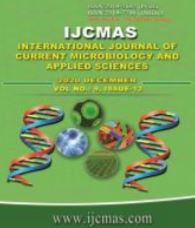


 National Academy of Agricultural Sciences (NAAS)
National Academy of Agricultural Sciences (NAAS)

|
PRINT ISSN : 2319-7692
Online ISSN : 2319-7706 Issues : 12 per year Publisher : Excellent Publishers Email : editorijcmas@gmail.com / submit@ijcmas.com Editor-in-chief: Dr.M.Prakash Index Copernicus ICV 2018: 95.39 NAAS RATING 2020: 5.38 |
In the context of increasing urbanization and globalization of agricultural production and marketing, localized food systems (LFS) have emerged as a theoretical framework to imagine and order methods to address the effects and impacts, In Bengaluru, India's "Silicon Valley" and one of its fastest growing cities, an increasing number of middle class residents are growing fruits and vegetables in their private spaces for home consumption. This article examines the possibilities of integrating stingless bees (Tetragonulairidipennis) in urban agriculture and urban forests across Bangalore. Urban gardening is considered as a middle class intervention into unsafe food systems and decaying urban ecologies; driven primarily by concerns about worsening food quality and safety. The tree diversity is found to rich Bangalore and considered as an urban forest with high species richness in parks and residential areas. An urban forestry study revealed 374 species with highest species diversity in parks (291) followed by residential areas and layouts (164) dominated by Polyalthia sp. and Pongamiaglabra. Urban agriculture and urban forest system in the Bangalore are ideal for stingless bee keeping, easily reared with limited space and care and provide a leisure time activity for the retired person, women and children. Moreover the possible pollination services offered by integrating these little bees cannot be foreseen.
 |
 |
 |
 |
 |